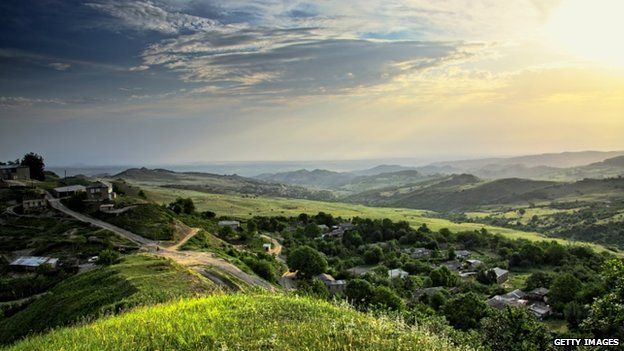Boston bombings: Was Dagestan the starting point?
- Published

The stunning scenery in Russia's Dagestan is in stark contrast to the shootings, explosions and assassinations which blight the region. Was this troubled republic a breeding ground for the extremism which drove the Boston bombing suspects?
When Tsar Nicholas I was searching for somewhere to build a fortress on the eastern fringes of the Russian empire, it's little wonder he chose what became known as Makhachkala.
This town is blessed with such natural beauty.
It would catch the eye of any Emperor.
To one side are the Caucasus Mountains - their jagged peaks stabbing the sky like daggers. On the other, is the Caspian Sea.
With its beaches and its promenades, and with a little imagination, Makhachkala could be Russia's St Tropez.
But St Tropez doesn't have nearly as many problems as this town.
The resort hotel I stayed in felt more like a last resort.
There was no running water, much of the building seemed to have been abandoned. At night, the door to our corridor was kept locked by hotel staff - and we had no key.
But, then again, security is important in the republic of Dagestan. This is Russia's most dangerous region.
You can see that just by reading the local government newspaper. I bought a copy when I arrived.
Making the news that day was the arrest of two men who had tried to sell seven rocket launchers and 2,000 rounds of ammunition on the black market; the murder of a former politician outside a mosque, and a roadside bomb that narrowly missed killing a police chief.
Shootings, explosions and assassinations occur with frightening regularity in Dagestan.
There are clashes between criminal gangs. There is also an ongoing Islamist insurgency. And there are many factors fuelling it, such as economic hardship and deep-seated feelings of social injustice.
Some here take up arms to tear the North Caucasus away from Moscow and turn the entire region into an Islamic state.
The Russian authorities maintain the violence is encouraged and funded by militants abroad.
That brings me to the explosions thousands of miles away in Boston and to the question: was Tamerlan Tsarnaev - the suspected mastermind of the Boston attacks - influenced or inspired in any way by Islamic militants in the North Caucasus?
Was it here that he was drawn to radical Islam? And did he go on to radicalise his younger brother Dzhokhar?
Last year Tamerlan travelled to Russia from the United States and spent six months in the North Caucasus, much of that time in Dagestan.
Why did he come? What did he do here? Who did he meet?
This week, journalists in Dagestan had the chance to put these questions to the parents of the two young men.
Their mother Zubeidat and father Anzor gave an improvised press conference. At times it was a chaotic affair. There were tears, and there was plenty of fist-banging.
Anzor said that Tamerlan had come to Dagestan in 2012 to spend time with cousins and apply for a Russian passport. And yet he never collected the document he'd applied for.
The father denied that his son had met up with militants - Tamerlan, he said, had spent time helping him renovate a flat.
Yes, Anzor said, his son had prayed in a mosque which is known for preaching a more fundamentalist form of Islam. But that doesn't make him a bomber.
I asked Tamerlan's mother, Zubeidat, what impression his six months in the volatile North Caucasus had made on her son.
"He was telling me about the killing," Zubeidat said.
"That the situation was strange here, with people killing each other."
Zubeidat Tsarnaev: "America took my kids away from me"
But on his return to America, she maintains there was nothing to suggest that he had changed or become radicalised. He was no terrorist. She and her husband refuse to accept their sons are guilty.
Vladimir Putin thinks they are. The same day as the parents' news conference, live on Russian television President Putin described Tamerlan and Dzhokhar Tsarnaev as "criminals" and called on Russia and the West to work more closely on the fight against terrorism.
US investigators spent two days in Makhachkala this week questioning the parents.
There are many unanswered questions. A direct link between the Boston bombings and Islamic militants in the North Caucasus has yet to be proven.
But I wanted to find out how have people in Dagestan have reacted to the attacks and to suggestions there may be a connection with their republic.
I asked a taxi driver called Magomed - he'd been following the news and told me the suspects "had brought shame on the whole of the North Caucasus."
But I was surprised to find that not everyone in Makhachkala was so interested.
At an internet café I chatted to a teenager.
"What do I think about the Boston bombings?" he asked. Then he shrugged his shoulders.
"Here in Dagestan, we have our own Boston every day."
How to listen to From Our Own Correspondent:
BBC Radio 4: Saturdays at 11:30 and some Thursdays at 11:00
BBC World Service: Short editions Monday-Friday - see World Service programme schedule.